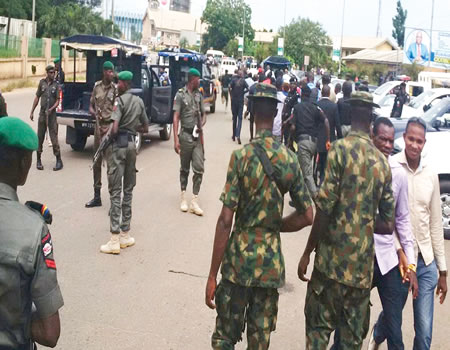Indeed, the outcry of the Senate was no exaggeration. The scale of killings in parts of the country, especially in Zamfara and Plateau states, suggests that things are fast falling apart and that something urgent and effective must be done to arrest the drift. The pronouncement of the senators followed the horrific killing of no fewer than 40 miners by bandits who invaded Gidan Maidawa, Wari, Tungar Baure and Mallamawa villages in Shinkafi and Maradun local government areas of Zamfara State. According to reports, hordes of gunmen shot at the miners at close range and without any form of resistance. The motion initiated by Senator Tijjani Kaura on the floor of the Senate culminated in many of his colleagues giving accounts of the exacerbating security situations in their respective districts.
Only recently, in Nasarawa State, the police confirmed that some gunmen ambushed and killed four workers of a mining company at Alongani village in Nasarawa Eggon Local Government Area. The victims were said to have been returning from work in a company truck at about 4.00 p.m. when they came under a hail of bullets. A China national, a police escort and two others lost their lives in the dastardly episode. These tragic harvest of deaths does not include the innocent citizens that have continued to lose their lives in the hands of terrorists through suicide bombings in Borno State, the main theatre of war between Boko Haram and the Nigerian troops that are on counter-terrorism operations.
And yet another theatre tragedy is Plateau State. On November 7, no fewer than 11 persons were killed and four others injured as gunmen ambushed villagers. According to the police, the assailants pumped hot lead into their victims who were returning from Rim-Dyem market in Riyom. The communities which have come under similar heavy attacks in the past included Wereh, Foron and Rim in Barkin Ladi Local Government, as well as Miango, Jebu, Taegbe and Ncha in Bassa Local Government. Alarmed by the situation, President Muhammadu Buhari has since ordered the military to launch a major offensive against the brigands behind the latest mindless killings in Zamfara State. He also approved the deployment of a full battalion of Special Forces in the state, the take-off of the newly-established 8 Division of the Nigerian Army in Sokoto State and the setting up of an intelligence fusion centre in Maiduguri, the Borno State capital. As Buhari noted, “This phase of the war will be intelligence-driven and the new centre is expected to intensify the harvesting and sharing of intelligence so as to bring to an early closure, the desperate, last-minute activities of the terrorists.”
Beyond rhetoric, and as Nigerians sulk and grieve over the constant loss of lives and the seeming siege on the nation by a few deviants, we need to remind the authorities that the primary duty of government is security of life and property. It owes the citizens the assurance of their safety wherever they reside or ply their trade regardless of their ethnic, tribal and professional backgrounds. It is disheartening that the government has virtually become defensive rather than being proactive in this regard. Death appears so cheap in the nooks and crannies of the country. While we commend the Federal Government and the nation’s gallant military officers and men for their efforts to restore sanity and preserve the country’s sovereignty, much can still be done through proactive and pragmatic actions and measures. Inter-agency collaboration is as key as eternal vigilance by the citizenry. Equally germane is undisguised cooperation from the international community, particularly the advanced nations with proven successes in the fight against terror and other violent crimes.
At the domestic front, the government must seek more realistic ways of promoting inter-ethnic harmony and concord. It should creatively engage traditional rulers, the custodians of the customs of the people, on the need for peaceful coexistence among the various ethnic nationalities making up the country. There is no better time to embark on such collaboration than now. With the increasing tempo of political activities ahead of the next general election, there must be more conscious efforts to check inter-ethnic tension and rivalry, all of which constitute a potential time bomb in the country. The Senate’s view that the security system in the country needs overhauling and its suggestions on how to raise the bar on security should not be discountenanced. Further degeneration in the national security structures will erode public confidence in the state and constitute another potential time bomb.






